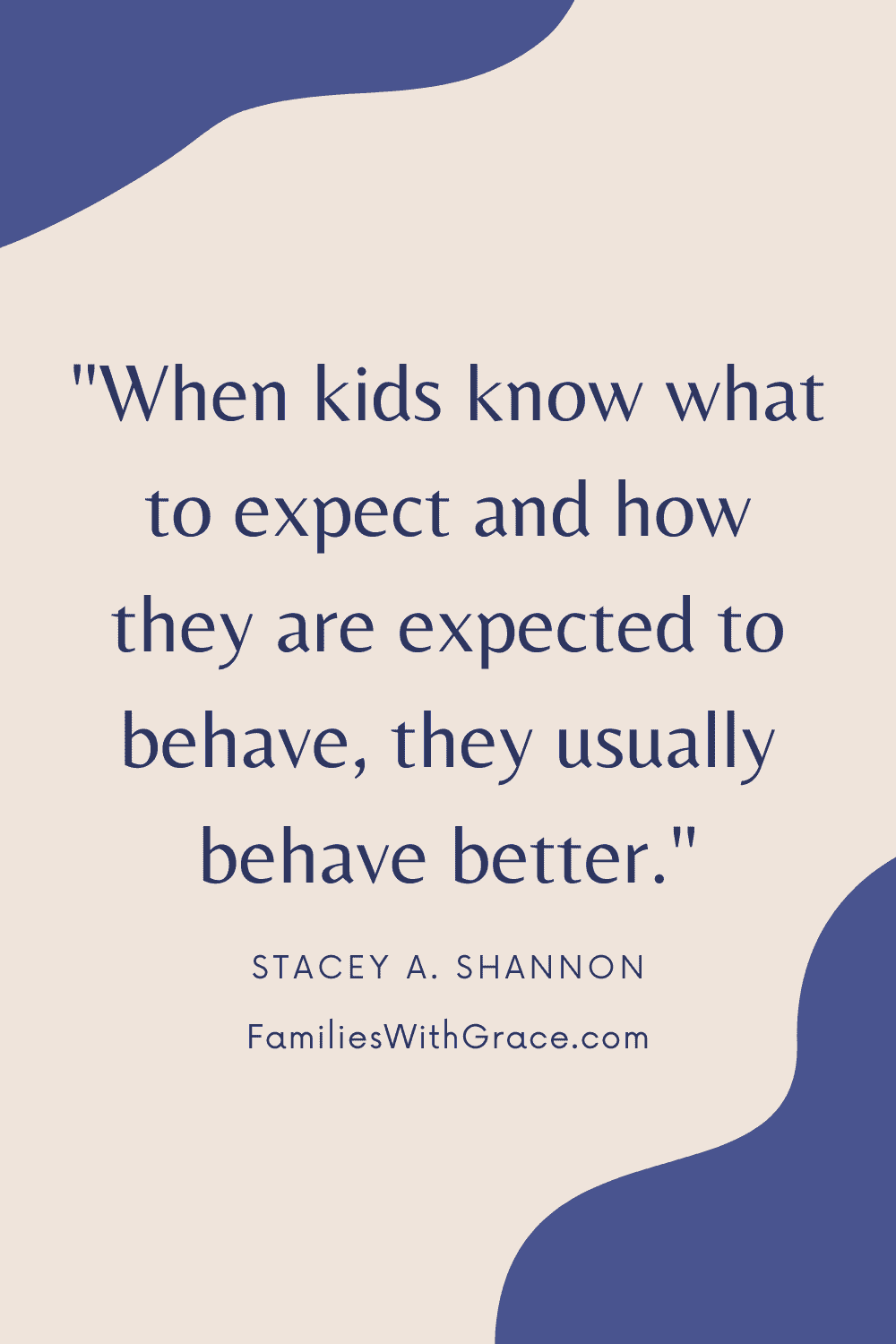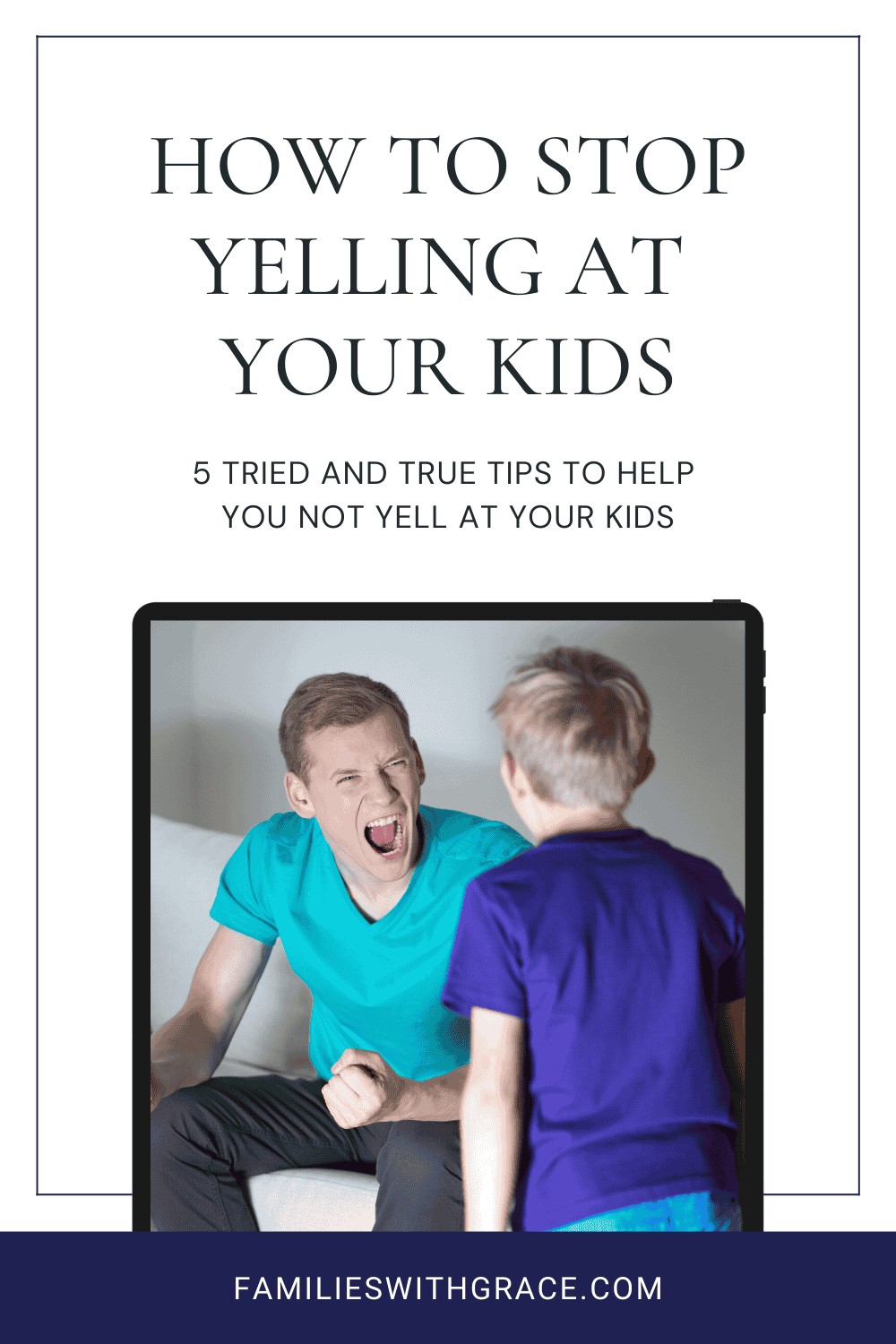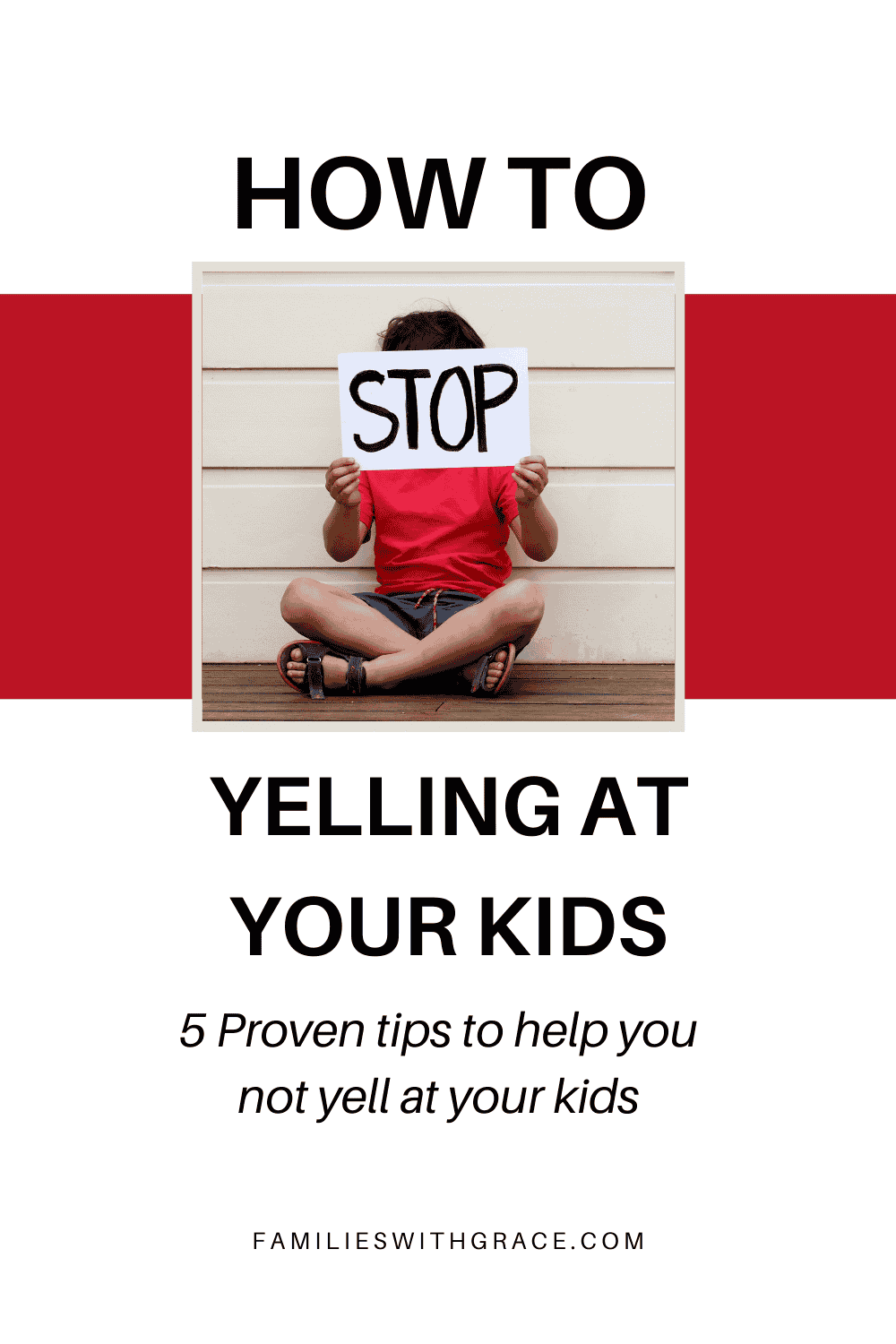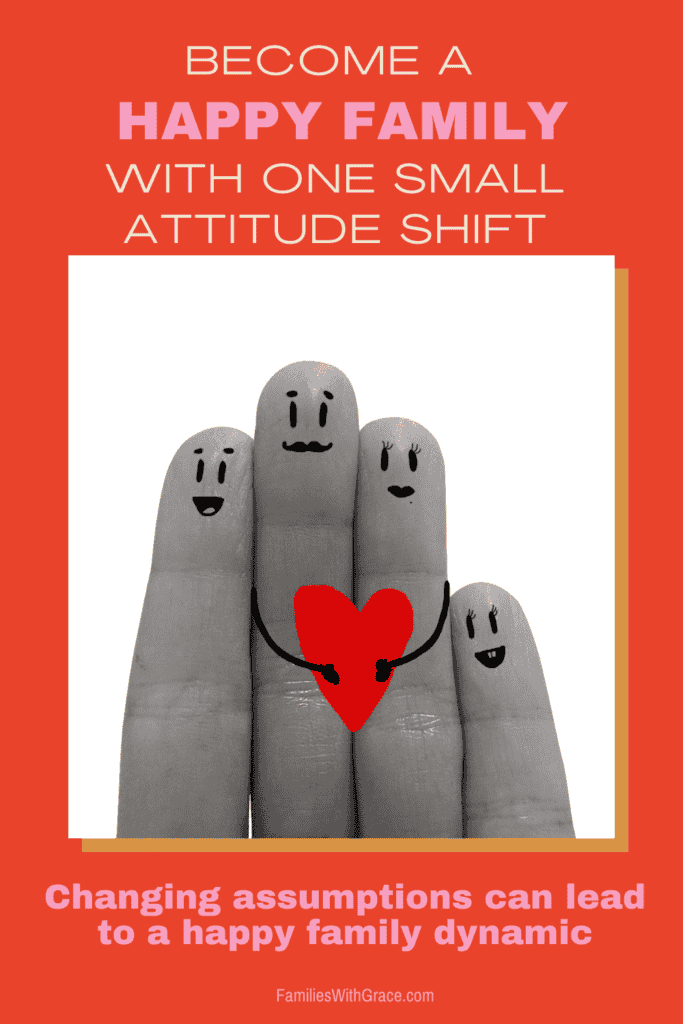5 Proven tips to help you not yell at your kids
We’ve all seen them. The parents at the playground who yell without abandon at their kids. They’re tired, exasperated and ready to call it quits. Maybe we’ve been that parent ourselves. None of us are perfect, but most of us don’t want to yell at our kids. When we welcomed tiny bundles of joy into the world, we didn’t envision a future spent with yelling and frustration!

But the question remains, can you effectively parent and not yell at your kids? Yes. It really is possible. I’ve been a parent for just a few days shy of 12 years and very, very seldom yell at my kids. And, you know what? My kiddos are both well behaved and their teachers often compliment their behavior.
I know every family is different with different needs and personality types. Check out these tips that work for us and see if maybe they could work for you, too, as you strive to not yell at your kids.
1. Don’t make empty threats.
Empty threats are those threats we know we aren’t going to follow through on — and our kids know that as well. So they don’t take you seriously. Their behavior continues. You get frustrated. To try and get through to them, you resort to raising your voice.
But empty threats don’t work. My husband and I made a plan when our first child was born that we’d not make threats we weren’t willing to follow through on. Sometimes that’s been hard. A couple of times, we’ve gotten into a pickle. However, it’s worked. Before I threaten a consequence for a behavior, I take two seconds to make sure it’s a consequence I will follow through on.
For example, when our oldest was a toddler, we were going to meet a friend of mine for lunch. I was excited to go to lunch. My daughter decided that day she would insist on doing everything herself — as toddlers like to do. In the midst of my frustration as I was trying to make her let me just put her shoes on for her, I nearly said, “If you don’t let me help you, then we’ll just stay home.”
The truth was my friend was coming from out of town, and it was a lunch I’d been looking forward to. Not going really wasn’t an option I’d follow through on. Instead, I shifted strategies and told her I’d count slowly to 10 while she worked on her shoes. If she didn’t finished by then, I would help her. She got to be independent; I got to make sure her shoes were on. We both got to enjoy lunch out.
If I had given the consequence of staying home unless she let me help her and then gone to lunch any way, she would have learned that I don’t always mean what I say. And soon enough, she’d stop listening to my empty threats. She’d continue doing what she wanted. I’d get frustrated and resort to yelling at her. It’s a slippery slope indeed!
Decide that if you are going to threaten a consequence that it’s one you will follow through on should your child not comply. I know it doesn’t sound so much like it has to do with yelling, but I think empty threats lead to yelling more times than not!
2. Have clear and consistent rules.
Another tactic to stop yelling at your kids is to set clear and consistent rules. Just like with empty threats, make sure the rules are reasonable and something you will consistently enforce. For example, one of our rules is that we speak to each other with respect. We don’t abide by name-calling or making fun of anyone. I always enforce that rule. If one of my kids speaks disrespectfully to another family member, they hear about it and usually have a consequence for it. This is a rule with no exceptions. It is also a rule for our entire family and not just the children. My husband and I also talk to our children and each other respectfully.
Other rules are sometimes broken with permission. But those are few and far between. Usually we don’t allow food upstairs at our house. However, during virtual schooling last year, we allowed my daughter to take snacks upstairs sometimes when she was on break.
Along with making rules, be consistent with them. Nothing is more frustrating for a child than inconsistency. If you do one thing one day and it’s OK, but the next day the exact same thing gets you in big trouble, it’s stressful and confusing. This also applies between parents. Talk with your spouse so you’re both on the same page with what’s OK and what isn’t.
My husband and I are usually on the same page when it comes to rules and discipline, but that doesn’t happen by chance. We’ve had many conversations about what is OK and what isn’t. We talk about how we handled situations and see what the other person thinks. Parenting is an evolving process as our kids grow. We have to keep in touch with our spouses about how we are going to handle new phases as they pop up.
Having each other’s back is also important. A couple of times my husband has backed me up when he didn’t necessarily agree with me and vice versa. Later (not in front of the kids) we discussed the situation. But in front of the kids, we showed a united front.
3. Communicate your expectations.
Once my kids were toddlers, I started talking with them before we went places about what I expected from them. I wasn’t giving lengthy speeches, but I’d say things like, “We are going to play with our friends at the park for an hour. But when mommy says it is time to go, don’t give me a hard time. We have an appointment we have to get to.”
Oftentimes I also gave my kids an idea of what to expect in new situations. I still do this to a degree. My son and I went to a meeting last week for an organization he wants to join. I explained up front that I didn’t know exactly what to expect, but we could ask questions. I reminded him that we needed to be on our best behavior.
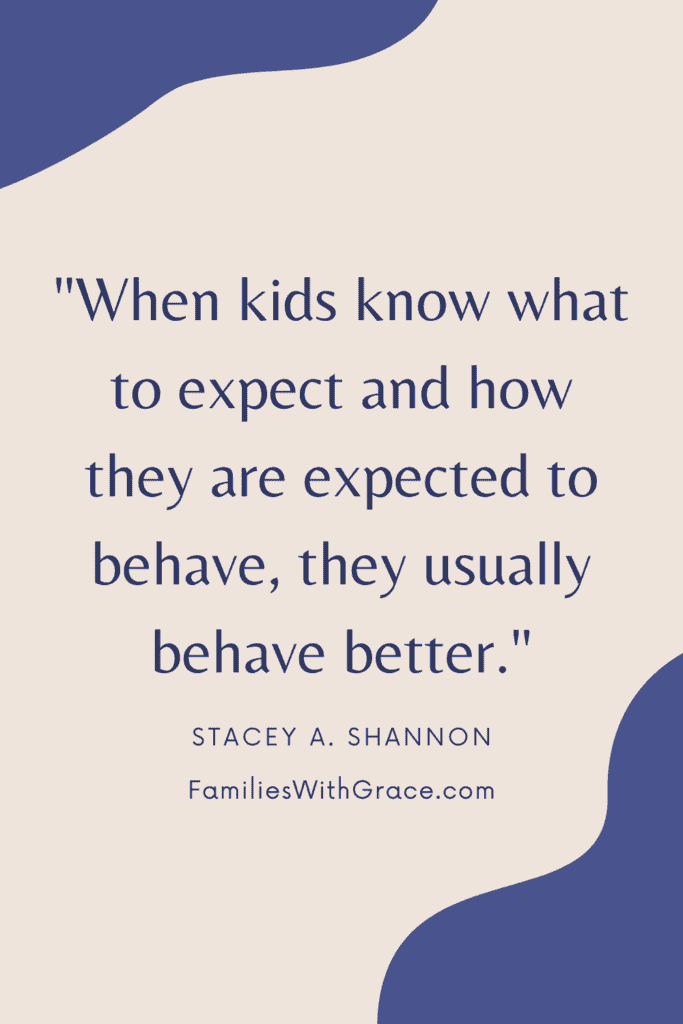
When going over expectations with my kids, I also rarely bring up times in the past that they didn’t make the correct choice about their behavior. Every so often I will use previous bad behavior as a reminder that if it happens again then we won’t be able to continue a certain activity. But again, I only say something like that if it is completely true.
When kids know what to expect and how they are expected to behave, they usually behave better. And when your kids behave well, it’s easier to not yell at your kids!
4. Address the root of the behavior.
No matter how great your kids are, sometimes they act out or behave poorly because of underlying reasons. And when that happens, no amount of yelling at your kids is going to solve anything. It’s just going to make both of you miserable.
While kids definitely need consequences for unacceptable behavior, sometimes what they also need is for us to take time to listen to them. Recently, my son was having a bad afternoon. The day turned out differently than expected, and he was frustrated. As a result, he made some bad choices and got in trouble for them. About 10 minutes later, the two of us were alone and he mentioned he felt he was unfairly treated by having a consequence for the behavior. He was calm about it and not defiant in any way. He was just being honest.
So, I sat down with him on his level. I explained his behavior warranted consequences and then asked why he was off that afternoon. He opened up and shared his feelings and why he was so frustrated. We talked it through. I listened to him. I commiserated with him, I understood him, and then I encouraged him. Together we decided the rest of the afternoon and evening would be good. And it was!
That heart-to-heart moment with my son took no more than five minutes. I understood where he was coming from. The consequence for his behavior remained, but he also felt listened to and validated. That’s what we all need. Had we not had that conversation, I’m guessing the rest of the day would have included more poor choices, resulting in my husband or me losing our temper and raising our voices. Getting to the root of the problem kept that from happening.
Another positive of getting to the root of the problem is letting our kids know that we are their safe place when they are upset. They can talk to us about anything. My conversation with my son started because he was sincerely telling me how he felt about getting in trouble. I want him to be able to do that. I have encouraged my kids to talk to us. Of course, I’ve had times that their honesty has made me bristle and I’ve had to keep it in check. But communication is what makes for good relationships. Talking is a much better way to communicate than yelling for sure!
5. Know when yelling is OK.
So even though yelling at your kids isn’t something you want to do on a regular basis, sometimes yelling is OK. The biggest time is when your kids are doing something dangerous and you need to get their immediate attention. Because my husband and I don’t yell often, when we do, our kids pay attention.
A few weeks ago, we were in the kitchen before dinner and my son started to reach for something right over a hot baking sheet that was on the counter. I yelled at him to stop. He immediately jumped back. While it scared him, I was OK with that because I needed to get his attention right away before he got burned. If he was somewhat de-sensitized to my yelling because I yelled all the time, I’m not sure his reaction would have been quick enough to save him from getting hurt.
And then there are times when the child is just not listening and continuing the bad behavior. The usual mode of operation in our family is to give two or three warnings to stop before we raise our voice. We don’t often have to raise our voices. But every so often we need to in order to get our kids’ attention so they actually listen and stop their behavior.
However, yelling at our kids is never our first response, unless they are in danger. If we yell at them unfairly, we apologize for doing so. Apologizing gives us the opportunity to show our kids that adults mess up and need grace, too.
Want more? Don’t miss these posts!

